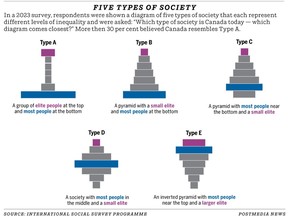Opinion: Extra Canadians really feel excessive inequality is rising and that dampens their aspirations to enhance their financial lot and weakens the hope that their efforts will translate into improved high quality of life

Article content material
Practically half of Canadian employees really feel as if the financial circumstances in Canada are “poor,” in accordance with our survey of two,500 Canadian employees in September of 2023. And one other 38 per cent stated they believed financial circumstances are “solely truthful”.
Commercial 2
Article content material
These findings are unsurprising, given the poor state of the Canadian economic system and the rising pessimism amongst Canadians towards it. Inflation and rates of interest each stay excessive, and job openings are struggling to maintain up with the rising labour drive.
Article content material
We now have tracked perceived inequality since September of 2019, after we launched the primary in a collection of nationwide surveys with the assistance of the Angus Reid Group.
We subsequently fielded comparable surveys every September from 2020 to 2023, with a complete of 18,500 individuals in our College of Toronto Canadian High quality of Work and Financial Life Examine. One purpose of our examine is to trace long-term tendencies within the financial lifetime of Canadians.
Canadians’ view of inequality
Perceived inequality is troublesome to measure, so we used a well-established technique that researchers have used for many years within the Worldwide Social Survey Programme’s Social Inequality Module.
Article content material
Commercial 3
Article content material
This technique contains displaying survey individuals pictures and descriptions of 5 forms of societies that every signify completely different ranges of inequality, and asking them which diagram they consider greatest represents their nation.
In our survey, we confirmed respondents a diagram of the 5 sorts and requested them: “Which sort of society is Canada at present — which diagram comes closest?”
Sort A represents probably the most excessive inequality, with a small elite on the high, few individuals within the center and most of the people on the backside. Between 1999 and 2019, the Worldwide Social Survey discovered no change within the share of respondents — 19 per cent — that believed Canada resembles Sort A.
However in our 2023 survey, 32 per cent believed Canada resembles Sort A.
Commercial 4
Article content material
The share that noticed Canada as a middle-class society (Sort D) plummeted from 29 per cent to 16 per cent. There was a dramatic shift within the notion of accelerating inequality, with 64 per cent seeing Canada as Sort A or B.
After we requested individuals what they suppose Canada ought to be like, 84 per cent desire a Sort D or E society, the place most of society are middle- or upper-class.
The price of dwelling and perceived inequality
The elements that form perceived inequality are complicated, however its relationship to the perceived price of dwelling stands out.
To measure this relationship we requested individuals: “How has your expertise of the price of dwelling modified through the previous few years?” The variety of Canadian employees who stated their expertise was “a lot worse” jumped from 28 per cent in 2019 to 49 per cent in 2023.
Commercial 5
Article content material
“We’re so cautious with our cash,” a 31-year-old operations assistant informed us. “Housing, meals, utilities and gasoline have gotten too astronomical to deal with — we shouldn’t be struggling!”
Anxiousness over the price of dwelling could cause individuals to really feel like financial inequality is worse than it really is. In 2019, 27 per cent of respondents who believed Canada’s price of dwelling was worsening seen the nation as a Sort A society with a small elite on the high and most of the people on the backside. Now, a whopping 41 per cent do.
“Everybody I do know has been chopping purchases,” a 59-year-old supply employee stated. “I haven’t bought undergarments for 5 years, toiletries for 3 years, and I’m solely capable of eat one meal a day, not extras of something.”
Commercial 6
Article content material
Canadians are disillusioned
Our discoveries assist a current report from Léger, a Canadian market analysis agency, that discovered two-thirds of Canadians really feel like “all the things feels damaged on this nation proper now.”
As a 37-year-old mortgage administrator stated: “The nation’s system is rigged in favour of the few on the expense of the various.” A 36-year-old photographer equally stated: “Our damaged tax system permits people on the high to take advantage of the system.”
The economic system depends on employee productiveness, and employees depend on the reciprocity of the economic system. It’s an trade relationship that appears more and more compromised, as employees are being hit hardest by inflation.
Perceptions of utmost inequality undermine individuals’s perception that the economic system is working for them. This, in flip, dampens their aspirations to enhance their financial lot and weakens the hope that their efforts will translate into improved high quality of life.
Commercial 7
Article content material
“Our leaders don’t do something,” a 34-year-old private coach stated. “I’ve zero religion in our political events.” Equally, a 47-year-old small farm proprietor stated: “The elite of all events rob, steal, and abuse energy for private profit, leaving the working class to pay.”
These in energy must be involved. As an example, many Canadians have misplaced religion within the Liberal get together’s marketing campaign promise to develop the center class. This lack of confidence poses a risk to the Liberal get together’s probabilities of re-election.
Scott Schieman is professor of sociology and Canada Analysis Chair on the College of Toronto; Alexander Wilson is a PhD scholar on the division of sociology on the College of Toronto; Jiarui Liang is a grasp’s scholar, division of sociology on the College of Toronto. This text was initially printed on The Dialog, an unbiased and nonprofit supply of reports, evaluation and commentary from educational consultants.
Article content material